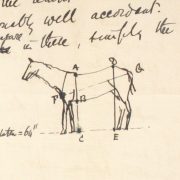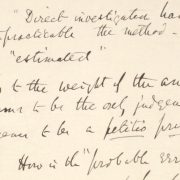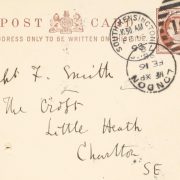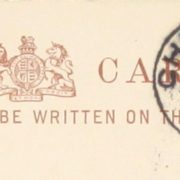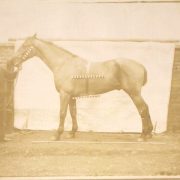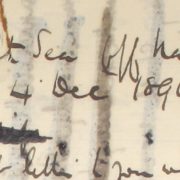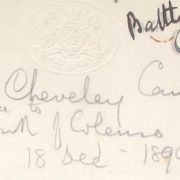[FS/2/2/4/2/2] (1)
*[1]
Cheveley Camp Close to & South of Colenso
18 Dec. – 1899
[Salutation Redacted]
[[1]] The events leading up to the Battle of Colenso must form the subject of a future letter, in this I will give you an account of the Battle itself which occurred on Friday 16th Dec —
We arrived at Cheveley early the previous day from Frere, as we got in to camp the
Bombarding of the Enemy’s Earth works was going on & lasted all day. I wrote to you that night
[[2]] as soon as I learned that it was decided to fight next day. We bivouacked that night sleeping ready dressed & moved off at 3am. [2 lines redacted] Knew nothing of what was in store for us. I handed all my money over to Morton & wished him good bye[sic] for he was remaining with the baggage. On we went with the first early streak of light, getting off as far as possible to the right under the cover of a hill so as to avoid drawing the enemy’s fire. The arrangement of the ground was simple[,] we were on a long exposed plain[sic], they were in
[[3]] rifle pits backed up by heavy batteries in hills opposite to us between the two positions was the River Tugela, the bridge over which was the object of the attack.
Now everyone knew that a direct attack of the enemy’s front was a hopeless business owing to the extraordinary strength of their position & that the only attack which could succeed would be one from the flank. We were placed opposite to the enemy’s left flank they holding a big hill full of rifle pits & the Kopje[2] (pronounced Koppies) or ditches surrounding it. The general idea of the battle you will have learned from the papers[.] I will tell you what occurred in our
[[4]] part of the Field & any incidents of importance or noteworthy facts in connection with the general engagement.
We had stolen into our position just as the sun was rising, it was a glorious sun rise & I turned to our Adjutant & remarked the words of Napoleon “it is the sun of Austerlitz” but unfortunately it was not, but of that hereafter. Our force consisted of the Cavalry Bgd. under the Earl of Dundonald consisting probably of 1200 horses of which the 13th were their only regulars as we had with us one battery RA. & an immense hill full of the enemy stood to our front towards which we advanced.
The name of the hill is Hlambalma[?].
Taking advantage of a dip in the ground the whole Bgd halted & the order was given to load carbines & ten rounds were put
[FS/2/2/4/2/2] (2)
[[1]] put in & revolvers also loaded. A few words of advice were given to the men about shooting steadily & only using the point of the sword & we advanced up the rise in the ground into position on the ridge[.] at[sic] that moment the first gun was fired & I looked at my watch it was 5.30 am & I thought of you & the children being fast asleep (2.30am) & unconscious of the game about to be pladed played.
The guns belonging to us soon came into action & in a few minutes the Artillery duel began in earnest we pounded the earth works of the hill in front of us with shell after shell, they all burst beautifully heavy firing against our centre was
[[2]] going on the guns bounding vomiting forth an incessant shower of shell the latter making a peculiar shreak[sic] as they appeared of the most alarming character, then they fall, up goes the earth to the height of 10 feet or more, & bang goes the shell dealing death all around as pieces of iron a pound or two in weight are hurled through the air. One shell exploded quite close to where a group of us were standing & a fragment the size of a racquet ball came buzzing along the ground in a straight line for me, but its velocity had been destroyed. I should have picked it up & sent it home to you but was frightened that another shell would fall at the same place.
[[3]] So with commendable discretion got under cover & lost my shell. Where we were fighting it was all dismounted[?] rifle fire, the bullets came in like hail on our men who all belonged to a local volunteer corps. The 13th being kept under the cover of a hill. This local corps lost 25 men killed in a very short time & I do not know how many wounded. They were about 400 yards in front of us & yet so accurate was the Boer fire that none of their bullets intended for them reached us. One came over with a peculiar whistle just over our heads but immediately in front of us death & destruction was being most liberally dealt out. At last a battery was sent for & the hill shelled[.] This had very little effect on the fire & we had to retire gradually after being in this position for about 3 or 4 hours!
Now the fact that we lost no men gave
[[4]] considerable confidence & one exposed themselves unnecessarily [4 lines redacted]. As a matter of fact the hill & ground in front of us was positively alive with Boers & they could have shot any of us over & over again who stood up to examine the position. I declared there was not a Boer on the hill, I could not see one through my glass (borrowed) no more could anyone else but they were there[,] as the men below us found to their cost, but so perfectly concealed that nothing whatever could be seen of them not even a hat or rifle and as smoke-less powder was used it was impossible to locate a single spot from which their fire proceeded.
While all this was going on the centre & left of our force advanced under fire of our artillery then commenced
[FS/2/2/4/2/2] (3)
[[1]] musketing[?] fire over our devoted artillery & infantry. It was one incessant rattle & roar, above all could be heard the pounding of the big machine guns used by the enemy as shell after shell & a hail of bullets fell among the infantry. In spite of it all you might have thought the men were on parade so steadily & without excitement did they advance. A shell would fall in a battery, (a sickening sight) down would go the gun team & men, loose horses would trot away mangled, the horses were cut loose & the guns taken on. Oh that magnificent man Tommy Atkins[3], I could have taken off my helmet to him, he never budged
[[2]] while passing through this hell fire but followed his officers & went where he was told. He is a splendid magnificent fellow, he was well hammered that day but I never heard one complaint.
Hunt’s division of Artillery got too far forward & were all shot down men & horses & the guns captured — From my hill I could see all this in the valley bellow & saw gun teams galloping about followed by shell the fall of horses & men on its explosion & the subsequent retirement
[[3]] Fellows volunteered to recover the guns but were nearly all shot[,] one man took 17 horses men with him to drag them back he returned with seven. Young Roberts volunteered for the task & got six bullets in him, he was buried close to where I am writing, this last night[.]
The battle began at 5.30 by about 2.30 the firing discontinued[?] & we all returned crest fallen to hear the sad news of the loss of the guns & of the devoted men. Hunt was badly shot & taken prisoner & dozens were killed[.]
There were lots of plucky acts & one man Buller on his own account gave the V.C before he died. I saw some very curious wounds & the Ambulance
[[4]] was a sight no man complained many smoked & were utterly indifferent.
We came back & on the road got some water at the station[,] what a sight! Oh if some painter had only been there to copy the expressions on the men’s faces. It was a fearfully hot day & no water what we got at the station had to be brought by rail we swarmed around the tanks like flies, but there was no shoving or pushing all willing to take our turn while thirst was printed on the face of men & horses. The men’s faces shewed no sign of defeat all were as unconcerned as if it were the end of a field day instead of a severe battle. Oh he’s a grand man!! Our camp was only a mile or two from the battlefield
[FS/2/2/4/2/2] (4)
[[1]] & you can imagine the eagerness with which the whole question was discussed & how for the first time we learned of our heavy losses & what had occurred in other parts of the field. Bear in mind the field of battle was nearly 10 miles in length this will give you a notion of the difficulty of describing the fight. On the extreme left of our force (you will remember we were on the extreme right) the infantry tried to cross the river. The ford was filled with barbed wire, crow’s feet (which are large three legged spikes) & every form of fiendish ingenuity for rendering a passage difficult.
[[2]] here several men were lost by drowning & the others driven back or killed by rifle fire. However we got back having been repulsed & the next morning an armistice until midnight was pro-claimed[sic] to enable the dead & wounded to be collected in the mean time the Boers had removed our ten guns from the Field. During the Armistice I rode towards the fated artillery field to have a nearer look at it accompanied by Jarvis. When about a mile or so beyond our outposts I spied three Boers mounted carrying a white flag.
[[3]] I said to Jarvis we must face this by riding straight up, we have no right here spying about but we can say we have been looking for wounded fortunately we had a name of a man to enquire after. We approached the group three little men riding ponies one with a stick & white handkerchief tied on it. I at once saluted the group & wished them good day which was replied to in perfect English & perfect accent.
The leader of the pack was a Transvaller the two other belonged to the Free State, they were dressed in ordinary civilian clothes & wore a rosette in the hat or button hole. I tacked myself on to the Transvaal Boer who turned out to be the Secretary of General
[[4] Botha commandynding the Boer army at Colenso his name was Steniberg & was most civil & interesting. He had been living in Holland & leaving his wife & children there[,] had come back to the Transval[sic] for the war. In Holland he was Secretary to Reitz or whatever his name is the European representation of the Transval[sic] State. He was most enthusiastic over Kruger[,] described him as a grand old man & that in spite of his years he would rule the Transval[sic] for another 10 years at least.
I avoided discussing any subject which might sound unpleasant, but I sometimes saw a puzzled look pass over his face at some of my questions at which I remarked at once that I should not feel offended if he were unable to give any answer to my question.
[FS/2/2/4/2/2] (5)
[[1]] I ought to have told you that after we met he said he had a letter for Gen’ Buller from Gen’ Botha & I offered to escort him to our outpost fearing all the time that I should get snuff[?] for being where I was. It was on our way that our long conversation took place[,] we discussed Transval[sic] politics, the wide and narrow minded Boer, the British soldier, Kruger, Jameson Rail. With regard to the latter I assured him that I did not think one person in England could be found to support it[,] that it was unjustifiable & we severely condemned it. Respecting the British Soldiers I pointed as we approached our outpost to the ‘man in brown’ & said there is
[[2]] the man you affect to despise, are you satisfied that he is no coward? They all three at once interposed most energetically protesting that Tommy A was a brave man & that they had never held any other view. I drew their attention to the way he had advanced under terrific fire the previous day as quietly as on parade[,] they acknowledged it was very fine. I paid a compliment to the Boer Army, he returned it by paying a compliment to our Artillery fire, we paid a compliment to the Boer Rifle fire, Steinberg’s only reply to that was [“]Oh! We always shoot straight![“]
[[3]] He had a pipe of my tobacco & I was quite sorry to leave him as we reached our outpost. Jarvis & I cordially shook them by the hand, & I could see our men looking on in the most curious & intended manner, also the fellows from the naval Brigade Battery which overlooked where we were standing. Handing them over to the officer on outpost duty we left, but Jarvis secured a snap shot of the group & I have promised him the most severe penalties if he does not print and send me one, it will be an interesting feature in the campaign the delivery of Botha’s letter to Buller after the latter’s defeat!! On return to camp the ominous news of a retrograde
[[4]] movement met me. We had ascertained during the day that the Boers had moved two guns to higher hills so as to shell our camp, Buller determined to move the camp back 4 miles & this could not be done until after 12 o’clock we struck camp at 10pm & slept on the ground until 2[.] I got no sleep whatever gradually the whole force with its 8 miles of Transport guns, carts, bullock & mule wagons were placed in motion we were favoured by a lovely moon up to 2am when suddenly a complete eclipse of the moon occurred & we stumbled on in the dark over stones, into holes took the wrong way some went too far others not far enough it was orderly chaos clothed in a dust as dense as a Novbr. fog & in this way we reached our present camp which is 4 miles beyond the one
[FS/2/2/4/2/2] (6)
[[1]] for which we fought the battle of Colenso. Now what are we going to do here is the question, some say Buller has gone back to the Cape & will attack them through the old Colony everyone agrees that the Boer position is impregnable to Frontal attack but it might be turned this morning however & this is the 19 Dec. a fellow of the naval Bgd tells us Buller is going to have another shot at them & I think it must be so for this fellow went up to the Naval Batteries, at the top of our camp which very shortly afterwards opened fire on the Boers & has been firing
[[2]] ever since. I expect he will pound them for a week & then attack. In the early morning we can hear the guns at Ladysmith firing[.] They must have some very heavy guns there to hear the report 20 miles away.
The firing was going on this morning but our own firing at the present moment is so heavy that I cannot tell whether it is still going on.
The weather is hot thirst intense, water bad & scarce — we send two miles for it. Last night we had a sharp thunderstorm & such lightening, Crums!![?] you[sic] would have enjoyed it
[[3]] Evening a great change since the morning the weather is cloudy & very cold[.] They say the rains which are very late are approaching.
Last night brought your [1 word redacted] letter of the 17 Novbr the final I have had from you since leaving Liverpool [4 words redacted]. There was also one you sent to Aldershot with enclosing one from old Clery[?]. He no doubt is out here by this time [.]
This afternoon I was going out some distance from camp to see an ox opened & who should I meet but a solitary horseman who turned out to be Bramhill! Isn’t it strange how one meets[.] I reminded him the order was Cairo, Charlton & Cheveley[.] He desired to be remembered & enquired kindly after you.
[[4]] I know his camp now & will look him up — [6 lines redacted]
I am sorry this letter is in pencil[,] I have written it on my pocket book resting on my knee & it has taken some time but I hope you will keep it as the record of a big though unsuccessful battle. God knows how the campaign will turn out. It looks to me as though Lady smith[sic] would fall, this would be a shocking catastrophe & will cost us South Africa.
This place is very dusty we are like niggers, in addition my face is like raw beef from the sun, lips
[FS/2/2/4/2/2] (7)
[[1]] Cracked, Khaki filthy & altogether very unlike the man you know. I have been on the hard ground for days, but there are so many scorpions & centipedes here that I have borrowed a stretcher & placed them on my medicine chests for to night[sic]. This may save a sting.
I have lost weight – the food is fair but I like more bulk. They have asked me to pay £10 contribution to the mess but I have put it off, it only represents two months keep & this is too high for a non drinker, it is the liquor which is so expensive & I dont[sic] see why I should pay for other fellows[.] However we shall see – I had an egg this morning it cost fourpence[sic]!!
[[2]] The country is all hills & rocks grass but no trees, no place where an atom of shade can be obtained [,] no water but the climate is good & the place will be very nice when the war is over. The people are all unfriendly to us, their sympathies are purely Boer. They wont[sic] sell us bread or give us water if they can help it.
I feel I have rather inflicted you with a long letter, but I have placed on record for our own perusal in the future a very important period in my life & that of the history of the country.
Do you remember a young fellow coming home from Egypt with me who I got into
[[3]] the service Bouston[?] by name. Well he is here with the RA & has done very well, he brought back the day after the battle several dead R A officers & has made himself generally useful he told me he brought two of the guns, but I have not heard it confirmed. At any rate he has identified himself with the corps & is no disgrace.
I met yesterday Parsons an old pal of mine when at Lucknow, he was then a subaltern in my battery, he is now a LtCol he was very pleased to see me & introduced me to several of his officers[.] He is very enthusiastic about my Manual of Saddles & made repeated references to it of a complimentary character.
Now this letter must close. I will post it in the morning as we have a camp post office here & there may not be another forward for some time.
[[4]] I hope Crawford sent you my telegram from Pietermaritzburg I wired to him almost immediately after the battle to cable to you & I hope he did it. I will send you a wire after the next battle I may be in, but ever should you not hear do not be alarmed as it may not be possible to cable. I will make my next cable cheaper by sending one word viz “Safe” this will come 4/-[4]
[5 lines redacted]
P.S. Morton is fit & well & doing me admir-ably[sic]. I gave him Kajne’s message.
[4 lines redacted]
[No Valediction]
(Please note that work on this transcript is ongoing. Users are advised to study the electronic images of this document where possible – https://vethistory.rcvsknowledge.org//archive-collection/fs-working-papers/)
[1] Annotation ‘Keep 29/5/23 Battle of Colenso’
[2] Kopje – South African Dialect, a small hill in a relatively flat area.
[3] Tommy Atkins is a slang term used for a common British soldier.
[4] Abbreviation for monetary shillings

